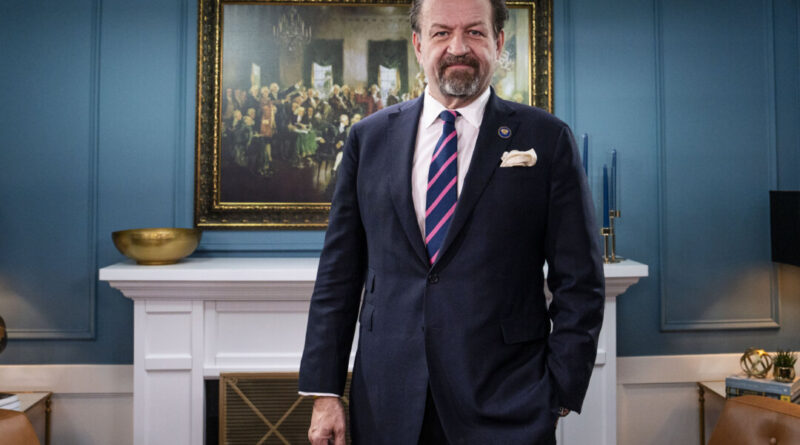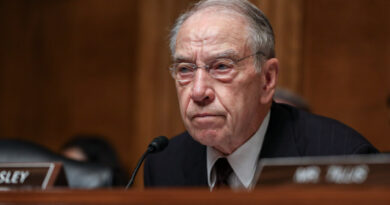Gorka Characterizes Trump’s Foreign Policy as ‘Surgical Strength’ — Neither Interventionist Nor Isolationist
Sebastian Gorka provided insights into President-elect Donald Trump’s perspective on foreign policy in an interview with Epoch TV’s ‘American Thought Leaders.’
According to Gorka, who served as a deputy assistant to the president during Trump’s first term and is set to return for a second, those trying to categorize Trump’s foreign policy as interventionist or isolationist are mistaken.
During his appearance on Epoch TV’s “American Thought Leaders” on December 17, Gorka offered his views on Trump’s upcoming foreign policy and national security strategies.
Trump’s actions in his first term, coupled with his campaign rhetoric and the appointments he has made for his new administration, have prompted speculation about his intended direction for U.S. foreign policy.
When asked about Trump’s foreign policy outlook and his recent suggestion for the U.S. to avoid involvement in the post-Assad power vacuum, Gorka stated that Trump embraces a calculated foreign policy that avoids both isolationism and interventionism, leaning instead towards what Gorka describes as “surgical strength.”
“He doesn’t just talk about red lines—he takes decisive action,” Gorka remarked.
He cited the Battle of Khasham as a pivotal example of this approach.
“When he learned that 300 Russian mercenaries were active in the Middle East, he didn’t simply warn Putin. Instead, he instructed the then-secretary of defense to eliminate them,” Gorka recounted.
He explained that the 2018 event demonstrated that the Trump administration was not aimed at invading Syria, but would firmly oppose Russian attempts to destabilize the area or threaten U.S. forces present there.
Another instance highlighting Trump’s “surgical strength” foreign policy was the drone strike on Iranian Gen. Qasem Soleimani on January 3, 2020, while he was traveling in Baghdad, Iraq. Despite Iran launching missile attacks against U.S. forces in Iraq in the aftermath of Soleimani’s death, no American servicemembers were killed, and tensions between Iran and the U.S. eventually decreased.
“This represents a precise, overwhelming use of force when necessary, while simultaneously concentrating on U.S. national security and American prosperity,” Gorka explained.
The Challenges Ahead
Looking ahead, Gorka highlighted that one of the initial priorities for the incoming administration will be evaluating the potential risks of terrorist attacks within the United States.
Estimating that up to 16 million individuals have illegally entered the U.S. during President Joe Biden’s term, Gorka voiced concerns over the number of those illegal crossers who may possess extremist intentions.
“If merely 1 percent of them are criminals or jihadists from groups like al-Qaeda, ISIS, Al-Nusra, or Hamas, we are facing divisional-sized threats, potentially involving thousands, if not tens of thousands, of malefactors,” he cautioned.
Gorka pointed out that the Biden administration’s approach to the U.S. withdrawal from Afghanistan, along with the recent turmoil in Syria, has amplified worries about re-emerging extremist threats globally.
Alongside his role as deputy assistant to the president, Gorka will also take on the position of senior director for counterterrorism on the National Security Council.
“There is much work to be done from day one concerning the domestic terrorist threat and the resurgence of global jihadism,” he stated.
The forthcoming Trump administration will also have to navigate the deepening alliance among Russia, China, and Iran. Although this partnership could establish a geopolitical counterbalance to Western institutions such as NATO and the European Union, Gorka noted that it requires a level of compatibility among differing ideologies.
He explained that while China and Russia are natural rivals, China leans toward a Maoist communist model, and modern Russia increasingly adopts a stance reminiscent of its pre-Soviet imperial past—tracking towards what Gorka terms a “proto-imperialist Russia.” Iran, meanwhile, follows an Islamic theocratic agenda.
“These are temporary alliances formed out of convenience, not solid partnerships,” Gorka asserted. “Yes, it may be beneficial for China to profit from selling arms to Russia amid its invasion of Ukraine, but does China aim to dominate Russia in the long term? Absolutely.”
Gorka also noted that Assad’s decline in power in Syria diminishes the standing of both Russia and Iran on the global stage, as both nations have backed Assad amid Syria’s ongoing, multifaceted civil war.





